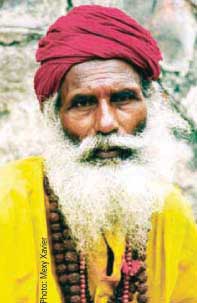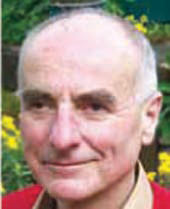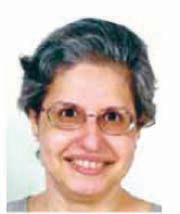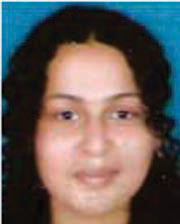- Home
- Archive -June 2010
- The Uncertainty. . .

The Uncertainty principle
- In :
- Personal Growth
June 2010
By Suma Varughese
Can we learn to move from the many what-ifs that consume us with fear to a serene acceptance of what is?
A few days back while mulling over this story, I was having lunch with a friend at her club. I had just about had the last morsel on my plate when she got a call. Her aunt, who had been ailing for a few months, had passed away. My friend’s son, said the caller, would pick her up in 10 minutes to take her to the hospital. Even as we waited outside the club for her son to come, she got another call. Her mother had fallen down and hurt herself.
Katherine Keefer, a talented US-based artist, sculptor, and poet says, “In the space of a year – at the age of 60 – I lost my marriage, my home, and my job. In the same year, my father and my brother both died. It took me two years to not feel like I was at the edge of the abyss, to feel connected and grounded, to feel like I had a separate self. At 60, I had expected to be reaping the harvest – to have my family around me, my home, my husband.”
Lakshmi Desai (name changed), a bright and able journalist, recalls the nightmare she plunged into when she married a man she met online and settled down in Australia with him. A closet homosexual, he was abusive and manipulative, threatening to break the relationship if she did not comply with his wishes. The apex was reached “the day he got violent with me, hit me and picked me up and threw me out of the house at 10.30 in the night. I fell in the passage on my fours and he locked me out. After several futile knocks from me, the neighbour downstairs came and took me to her house.”
Reinhold Koglmeier, who belongs to the spiritual organisation called Friends of Bruno Groning, recalls the time when life suddenly whipped out its iron hand from the velvet glove and gave him a hard wallop across the face. At age 55, he was given notice from his company that his services would be terminated in six months’ time. Koglmeier decided to start a direct marketing business himself, relying on his girlfriend to support him on it. She also offered to have him move into her flat. He accordingly found someone to take his flat and was all set to move into hers at the end of the year, when lo, she fell in love with another man and moved in with him at once. At one fell swoop he had lost his business, his girlfriend and his flat. “I had no idea what the future would look like or whether I would ever find a job again being 55 years old,” he says.
Werner Erhard, the founder of EST and Landmark Forum once said something memorable. “Life comes at you like bullets from a gun.” Rat-a-tat tat, without any hint of what the next moment contains. And there’s no way out. For this is life.
And yet this basic truth is so obscured to us. For the longest time, we float by in a cloud of unawareness, unable to penetrate the utter unpredictability of life. perhaps this is just as well for surely it is one of the hardest and most wrenching realisations to come to terms with.
 Glorious as these blooms are they wither in days Glorious as these blooms are they wither in days |
Here, for instance, is one man’s account, from The Varieties of Religious Experiences by William James, of how he felt when he suddenly penetrated this truth. He had lately seen an epileptic reduced to idiocy in an asylum, and the fear came to him that there was nothing to guarantee he would not become like him: “That shape am I, I felt, potentially. nothing that I possess can defend me against that fate, if the hour for it should strike for me as it struck for him…something hitherto solid within my breast gave way entirely and I became a mass of quivering fear. After this, the universe changed for me altogether. I awoke morning after morning with a horrible dread at the pit of my stomach, and with a sense of the insecurity of life that I never knew before…I remember wondering how other people could live, how I myself had ever lived, so unconscious of that pit of insecurity beneath the surface of life.” I too, had penetrated this truth somewhere in my youth and I remember lying sweating at night with the fear that there was no guarantee that I would not end up in a ditch somewhere, destitute and unwanted.
No guarantee that we will draw the next breath, no guarantee that our loved ones will live beyond the moment, no guarantee that we will have our limbs or reason beyond the moment, no guarantee that a dreadful disease will not lay us low. No guarantee, period.
Fortunately, life helps us ignore this by enfolding us in routine. She lulls us into slumber through our schedules, our morning walks, weekly kitty parties, monthly family gatherings, and the stultifying sameness of everyday life. We begin to believe that life will continue in the same vein – that we will reach home from work every evening, we will wake up every morning, we will commune with our dear ones each day. Our lives are programmed to expect everyday, unchanging sameness.
Coping strategies
Of course, the sceptre of uncertainty cannot entirely be kept at bay. There is too much evidence of it at any given time. And so we invent a thousand ingenious ways to deal with it. We look for it in power, fame and money. Swami Yatitananda, a monk at Divine Life Society, Rishikesh, offers the example of a crorepati who gets his accountant to calculate how many generations of descendants his wealth would suffice for. When he is told that there is enough money to last seven generations he is consumed with fear. “What will happen to the eighth generation?” he gibbers.
Another strategy to stave off uncertainty is through planning, and organisation. We strive to anticipate and make provision for every possible contingency, thereby securing safety and security. The West is particularly prone to this sort of thing by creating watertight systems in all areas of life. People are so used to trains running on time or traffic proceeding smoothly that when things go wrong, they are struck down in shock. 9/11 was a monumental tragedy but it is a sure bet that any city in India would have recovered much sooner from the disaster for the simple reason that we have gone through so many disasters that our coping mechanisms are far more refined.
Another favourite ploy is to cultivate relationships. Don’t we all enter into love with the plea, “Promise you will love me forever!” people marry hoping that they will have a life partner forever (as Katherine proves – there is no guarantee of that happening) and here in India our children are our insurance for old age. The idea of life insurance, medical insurance or any other form of insurance is an investment made to protect oneself against sudden contingencies. The very existence of society, of family and every institution known to man is to insure against the crippling uncertainty of life.
The hard truth
One may ask at this juncture, if it is even feasible to live without this soft coating. Is it really possible to remember at every moment that the next moment is forfeit without going nuts? Can we really keep worrying about our next breath or if we are going to see X or Y ever again? After all, wasn’t it TS Eliot who wrote that the human mind cannot bear much reality?
 Most sadhus lead uncertain lives Most sadhus lead uncertain lives |
It is true that this realisation is hard to bear. However, it is equally true that at one point or another life will force us to confront it. Our purpose for living is growth and evolution and therefore we will be forced to part with all that is false and illusory. Whether we like it or not, at some point we must confront the reality of life’s uncertainty even if it exposes us to excruciating pain and anxiety.
Anisha Anilraj, a 27-year-old academic of biological sciences based in Chicago, was exposed to this realisation at a tender young age.When she was six years old, she, her parents and grandfather were on their way to their native Kerala for Diwali by train. Halfway through, her grandfather passed away, soon after he had asked her mother how much longer they would have to wait for lunch to be served. The family hastily disembarked, located a doctor, arranged for the body to be taken to Kerala and spent their much-looked-forward-to holiday on the last rites of a beloved patriarch.
Anisha says, “The entire experience left me acutely aware of the impermanence of things. I would wake up at night and crawl next to my mother and stick my little fingers under her nose to make sure she was breathing. Sometimes I would just shake her awake to be sure. As I grew older I tried to control everything around me so as to leave nothing to chance. Most of the time it worked, but my mind was constantly filled with dread, with caution; and when things did transpire how I wanted them to, my relief was only momentary before I moved on to trying to control the next thing.”
To secure a semblance of certainty through control is our first natural reaction. But alas, we are still operating from the world of illusions when we attempt this. Sooner or later we have to cease to control others or hedge our bets, for it only creates misery for us and others.
Handy insights
How do we move beyond this stage? What are the insights or changes of attitude that can help us come to terms with uncertainty in a healthy manner?
One of the most important thing is to cultivate our coping mechanisms. If we can develop our skills, our endurance, our determination and so on, then gradually we realise that we can cope with whatever life sends our way.
A friend has had one of the rockiest life paths I have known, which includes among other challenges taking care of a handicapped brother, having to earn a living at the age of 10 and going through a painful divorce. Through it all, she has grown to such an extent that today she is a radiant and accomplished woman who is a massive force for the good in the lives of all who know her. She met and mastered the worst life could throw at her and instead of destroying her, it only built her up.
Lakshmi too found a silver lining in the cloud of her bad marriage: “I realised after months of reiki, listening to spiritual music and prayer, that life is too short and if someone doesn’t value me, I am insulting myself by being with the person. I learnt to become secure within myself and treat myself well. I also learnt to love and respect myself which perhaps I may not have earlier which is why I was in this situation. I had also to work through and let go of my desire to have kids. I have always loved kids and one of the main reasons for marriage for me was that I could have kids. Today, I no longer regret that I don’t have any and consider it God’s will.”
Reinhold was eventually helped to find a job almost at the same salary as the one he had lost, through the active intervention of a company he had once done a good deed to; and a network of loving and supportive friends enabled him to emerge from his bleak period. He too is savouring the many lessons the event held for him, including the truth that age apparently does not shield anyone from the arrows of the dreaded cupid! He says, “It is good to have a circle of friends who can widen your viewpoint. It is also good to always have a helpful and positive attitude.”
One of the most reassuring insights as we try to come to terms with uncertainty is to recognise that the stuff life throws at us is not to bring us down or destroy us. It is to help us grow. Life is not a whimsical hobgoblin delighting in our misery – she is a loving though stern teacher who is determined to help us overcome all the obstacles that hobble and limit us.
The law of karma
Another insight that can help bring in some level of order to the uncertainty of life is to acquaint ourselves with the law of karma. Whatever comes our way is the effect of our past action and therefore it is just. no god up there is throwing random thunderbolts at us. And the corollary: what we made we can help unmake. Yes, past action may have gifted us a broken marriage or bankruptcy, but we can learn the lessons these situations hold for us and therefore ensure that we do not reap the same harvest twice. To earn good karma through the events that befall us is one way to control what comes to us at least in a future life, if not in the present.
Finally, if we get only what we deserve, why worry about the future? This is a logic that really works for me. Why should I lie in bed worrying about the house burning down or having a thug burst into my house, or coming down with a deadly disease? Only what is meant for me will come my way, and that will prevail no matter what I do, so why worry?
 Reinhold Koglmeier I had no idea what the future would look like or whether I would ever find a job again. |
Recently, the country went quietly mad when swine flu hit the land. For the first time, I actually saw hundreds of commuters travelling with masks on, petrified of catching it. If they had chosen to recall that they would only get it if they were destined to, they would have found some comfort in the midst of the terrifying situation.
But of all the measures, the most potent and comforting is the power of faith. Those who are privileged to have faith in the processes of life, or faith in the creator, will walk so much more surely on the path of uncertainty, for they can feel an unseen hand leading them on, guiding them, supporting them and protecting them. They recognise that they are not alone in the enterprise of life and that in itself is a great solace. Oftentimes, this faith is even further strengthened in the course of the events that befall them for they often encounter unexpected kindness, inexplicable coincidences and even miracles. Says Lakshmi, “My bad marriage has reinforced and strengthened my faith in God even more and today nothing fazes me that much because I believe there is a higher power protecting me at all times.”
Nazneen Thanawala, a 50-year-old Mumbai-based seeker, says, “My unshakable faith in God coupled with cheerful optimism in the face of adversity has gone a long way in helping me to weather the many storms in my life.”
She describes an experience that has reinforced this faith: “Two years ago, while returning home, our car was hit with great force by a truck and even though the car was a complete write-off and my younger son had a fractured arm, my elder son, my husband and myself only sustained minor injuries. Everyone said it was a miracle that we had come out of the ordeal alive. I am convinced that we survived solely due to amazing grace and I have no words with which to thank Him for watching over my family and helping us to heal.”
The next step
Managing uncertainty, however, is not enough. For it does not heal us of the fear, the anxiety, and the existential angst of life. As long as even a tremor of unease runs through us at the thought of the future, as long as the mind spins even one eventuality that we cannot embrace, our freedom, our happiness and our peace of mind is conditional. We must forge on further.
The journey inevitably bring us within, into the area of self-exploration. As we become aware of our thoughts, words, feelings, reactions, fantasies, we discover ourselves anew. We recognise the emotional and psychological needs that enmesh us; the many regrets, blocks and limitations our past has bestowed upon us; and the fears and worries that the future raises. With deep and patient work we gradually come to terms with these aspects. The more we do so, the more at ease we become with ourselves. As our needs for status, recognition, possessions and love dissolve, our dependence on the outside world recedes. We become stronger and less fearful of the future. We discover within ourselves a source of undying strength and that enables us to finally look at uncertainty without flinching.
By a supreme act of grace, it may be that we are accorded a glimpse of who we are – an unconditioned whole and perfect Self, resting in perfect safety and security within itself. It is this discovery of our real Self that is the final vanquisher of the uncertainty principle. Our mighty journey is done.
Nothing in life can threaten us anymore for we are whole and complete within. Loss of family? So be it. We may grieve but we will not break. Loss of reputation? What does it matter as long as our conscience is clear?
A Zen master was once accosted by an angry man holding a baby. “You rascal,” screamed the man, “You have taken advantage of my daughter. She says this baby is yours. Take it, we do not want it.” “Is that so,” responded the master with perfect composure and took the baby. He raised it with tender loving care until a few months later when the man came back to him, wearing a contrite air. “I am sorry, master,” he said. “My daughter has confessed that the father is a young man living in the next village. I have come to take back the baby.” “Is that so?” responded the master composedly once again, while relinquishing the baby.
And so it goes. Loss of life? Immortal as we are, encased in a mortal body, what room is there for fear or resistance?
Embracing uncertainty
Once we reach this stage or anywhere near it, we embrace uncertainty as robustly as we would an old friend, for it holds unbelievable gifts for us. Swami Yatitananda recounts an experience when he decided to live for six months as a mendicant monk, throwing himself at the mercy of life. He set off from his Rishikesh ashram to Badrinath by bus but unfortunately there was a blockade that prevented the bus from going further. Eventually at 3 pm, the bus turned back and Swamiji got down at the nearest place to look for food, not having eaten anything since he set off at 4 am.
 Nazneen Thanawala Nazneen ThanawalaMy unshakeable faith in God and my cheerful optimism help me weather storms. |
As luck would have it, thousands of pilgrims had turned back too, and there was no food in any restaurant, nor was there likely to be any time that day. There was not even a room to be had. He finally settled into a small Shiva temple and endured a violent conflict of feelings. His small self was aghast that he had already had to starve on the first day of setting off, while his Big Self was serenely in favour of surrendering the matter to God.
Eventually the big Self prevailed and Swamiji sank into an exhausted sleep.
He woke up two hours later in the early evening when a large party of South Indian pilgrims under the stewardship of a sadhu came to the temple. They too were spending the night in the temple and after some pleasantries, the party set to work. Soon a delicious smell wafted through the air and to his profound gratitude, Swamiji saw placed before him a plateful of his two most favourite dishes: idlis and puliogre (a dish of sour spiced rice). Says he, “It is one of the most powerful experiences for me. Here I was worried about food and doubting God’s providence, but the moment I left it to God’s will I was not only provided food but with my favourites!”
Needless to say, Swamiji’s six-month stint as a mendicant continued in the same way and he found himself provided for at every turn.
For many sections of society, uncertainty is the warp and weft of life. Farmers and fishermen cannot ignore even for a moment their utter inability to control the forces of nature. Such a realisation keeps them humble, grateful and grounded.
A personal experience
In my own case, uncertainty reared its powerful head when my mother fell ill eight months back. The first two months went in going in and out of the hospital as she kept morphing into various different ailments. Routine, comforting routine, was hurled aside like an old rag, and my sisters and I braced ourselves each day for the new surprises that unfolded.
 Anisha Anilraj ‘I tried to control everything around me so as to leave nothing to chance.’ |
Then she experienced a massive stroke that left her bedridden with a paralysed arm and leg. A fortnight later I brought her back home for the doctors could do no more. I had by then got a resident caregiver and I hoped that life would once again settle into a routine, and I could pick up the threads of my life afresh. Barely a fortnight later, she went for her monthly day’s off and never returned.
It was a shock but it taught me an invaluable lesson. Life was fundamentally uncertain and I had no right to expect anything else. Even six months later, the situation has not settled down. As I write these very words, our third caregiver is leaving us thanks to a spondylitis problem.
Will I get another maid? I don’t know. Will my life ever return to normalcy? I don’t know. Will I be able to cope with the situation? I don’t know.
And you know what, I don’t need to know. I am learning to be friends with the unknown, and I too, like Swamiji, am overwhelmed by the gifts that are being showered upon me.
Lessons learnt
The first is to never take anything for granted. We have recently moved to a new office just a ten-minute auto ride from my place. After 30 years of commuting, this feels like liberation. But I am careful not to take it for granted, for it may dissolve any moment, and with it the view outside my window which I love. Instead, I am enjoying the proximity and view as much as I can. I don’t take friendships for granted or the presence of loved ones. Uncertainty coils around everything like a fog and all I can do is to enjoy what I have when I have it.
Says Lakshmi, “The bad marriage has made me recognise that life brings no guarantees of happiness or sorrow with it and it is up to me to make the most of every day. Today, I try and find happiness in everything, count my blessings, whinge less and am truly grateful for all that I have and that I am still a sane, productive person after all that I suffered.”
Like Lakshmi, I too am learning to be grateful for all that I have, for none of them need have been. For my health, my job, my family, my friends, for the many acts of grace that surround my mother’s situation. Each caregiver, for instance, has been better than the last.
I am recognising more and more what a superlative teacher uncertainty is. By parting the veils of illusion, she puts us in touch with reality and we see life right side up for the first time. We see our petulant insistence on control for the folly that it is, and flow instead with life.
The complete acceptance of uncertainty is nothing but surrender. We let go of all desire for control. We cease to anticipate the future. We steep ourselves in enjoying the gifts of the present. no wonder that sages and teachers have always advocated the path of uncertainty.
Says Eckhart Tolle in his book, A New Earth, “If uncertainty is unacceptable to you, it turns into fear. If it is perfectly acceptable, it turns into increased aliveness, alertness, and creativity.”
Says Sadhguru Jaggi Vasudev, “Unless you learn to live with the fluidity and the uncertainty of life, without creating a false sense of certainty, then you lose all your sense about life.
Samadarshiniji, one of the leading teachers of the One World Academy says, “The nature of the universe is uncertainty. Misery comes as long as we are afraid of it. For one who is in the present, the universe is in motion. With awareness it is possible to live a happy life.”
Once we open our arms to uncertainty, we balance ourselves in the moment; not peering behind at the past, nor craning forward to the future. In that moment, certain happiness, certain stability and certain stability unfold.
To read more such articles on personal growth, inspirations and positivity, subscribe to our digital magazine at subscribe here
Life Positive follows a stringent review publishing mechanism. Every review received undergoes -
- 1. A mobile number and email ID verification check
- 2. Analysis by our seeker happiness team to double check for authenticity
- 3. Cross-checking, if required, by speaking to the seeker posting the review
Only after we're satisfied about the authenticity of a review is it allowed to go live on our website
Our award winning customer care team is available from 9 a.m to 9 p.m everyday
The Life Positive seal of trust implies:-
-
Standards guarantee:
All our healers and therapists undergo training and/or certification from authorized bodies before becoming professionals. They have a minimum professional experience of one year
-
Genuineness guarantee:
All our healers and therapists are genuinely passionate about doing service. They do their very best to help seekers (patients) live better lives.
-
Payment security:
All payments made to our healers are secure up to the point wherein if any session is paid for, it will be honoured dutifully and delivered promptly
-
Anonymity guarantee:
Every seekers (patients) details will always remain 100% confidential and will never be disclosed
